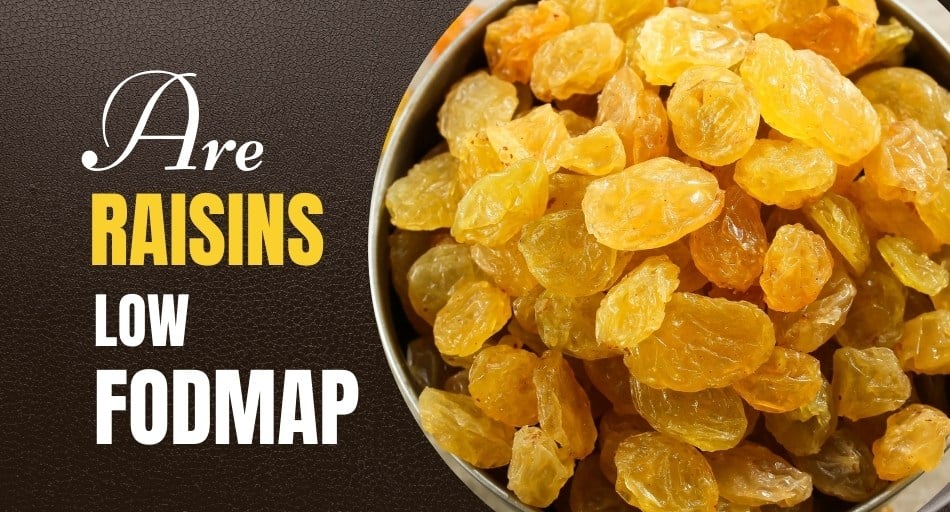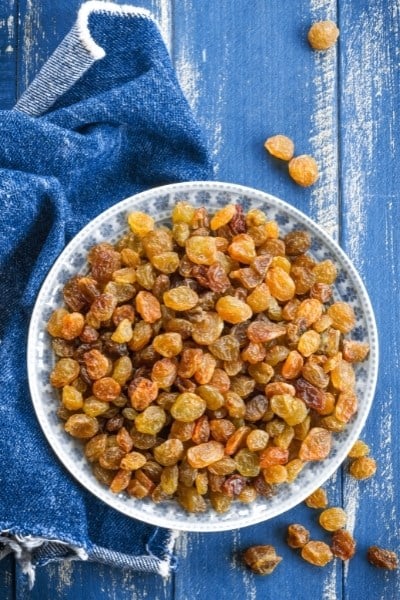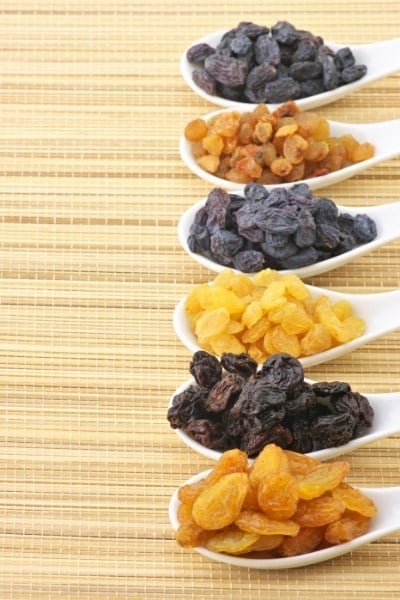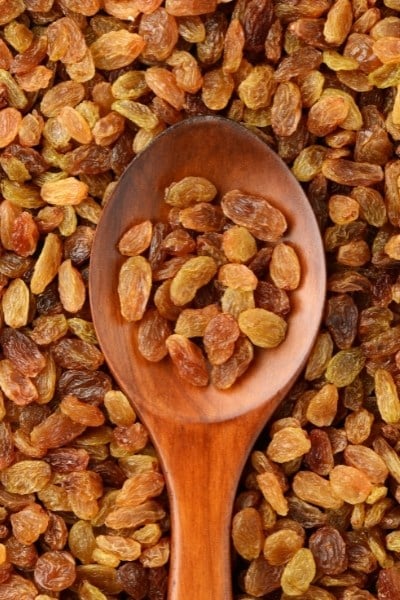Following a diet low in FODMAPs has been shown to improve the symptoms of irritable bowel syndrome (IBS). This is because this diet limits how many indigestible carbohydrates you’re allowed to consume.

But sometimes, it might be hard to figure out which foods are safe for this diet, especially when it comes to snacks. Most sweet foods tend to be high in FODMAPs, so you have to be careful how many you consume.
For example, raisins – which are a common ingredient in many baked goods – are high in sugars. But are they also high in FODMAPs? Can you have some raisins on a low FODMAP diet?
Table of Contents
Are Raisins Low FODMAP?
Raisins are considered a high FODMAP food, but if you consume them in smaller portions, you can include them on a low FODMAP diet. They’re still high in carbs, so make sure to stick to the exact recommended serving to avoid any digestive system issues.
If you do that, eating raisins can bring you some good health benefits along with some sweetness.

For example, raisins contain many plant compounds that have disease-fighting properties. So, it might be a good idea to include them in your diet.
How high in FODMAPs are raisins?
Generally, raisins are high in FODMAPs, as most of the calories found in them come from sugars. But small amounts should be tolerated by most people on a low FODMAP diet.
A serving of around one tablespoon (13 grams) of raisins is OK and shouldn’t trigger any IBS symptoms.
Anything more than that is much higher in indigestible carbs, which can worsen your IBS and even trigger additional symptoms.
What’s more, raisins are generally high in carbs and sugars. This macronutrient tends to worsen IBS symptoms and often leads to indigestion.
So, that’s yet another reason to control your intake of raisins.
Can you eat raisins on a low FODMAP diet?

Raisins are allowed on a low FODMAP diet but in small servings. Anything larger than 13 grams of a tablespoon of raisins is very high in oligo-fructans, which are a type of FODMAPs. So, keep that in mind and adjust your serving sizes if necessary.
Also, be careful when eating foods containing raisins like bread rolls, cakes, and other sweet desserts.
Unless you make these yourself, it might be hard to determine how many raisins are in the finished product.
So, aim to consume smaller portions than the standard serving.
You can also make raisins yourself, as it’s a very easy process. Simply take some grapes and remove the large stems. Then, wash them thoroughly and place them on a tray in a sunny, dry spot. Keep rotating the grapes from time to time to ensure even sun exposure.
After a couple of days – about two or three – you’ll have your own raisins that are also likely to be lower in sugars than other store-bought versions.
So, you also might be able to consume more without triggering any IBS symptoms.
Are raisins good for you?
Most of the calories in raisins come from carbohydrates and sugars. But there is still some fiber that you can get from this dried fruit.
The fiber in raisins helps you stay full for longer after eating as it slows down the emptying of your stomach.
So, you’re less likely to consume too many calories, which can lead to weight loss in the long run.

Fiber also helps with digestion, reducing your risk of constipation. This is especially important for people with IBS, as it improves the health of your digestive system.
Raisins are also a great source of potassium, providing you with 195 mg of this mineral in a single one-ounce (28 grams) serving.
Potassium works as an electrolyte, helping maintain fluid balance in your body and prevent dehydration.
What’s more, potassium helps offset the negative effects of dietary sodium on your blood pressure.
Thanks to that, you’re at a lower risk of strokes and heart attacks. That’s why it’s important to include a lot of potassium-rich foods in your diet.
In addition, studies show that consuming raisins can improve performance for athletes participating in moderate- to high-intensity endurance exercise. This is because this dried fruit contains a lot of carbs, aiding in exercise recovery and improving energy levels.
So, including raisins as a snack during or after a workout can be beneficial.
What’s more, raisins contain a good dose of iron. This mineral is crucial for the formation of red blood cells, which helps transport oxygen throughout your body. Because of that, getting enough iron helps prevent anemia.
Since raisins are dried fruits, they contain a lot of powerful antioxidants. These plant compounds help flush out free radicals from your body, preventing oxidative stress and damage to your cells.
As a result, you’re less likely to develop various chronic conditions, such as diabetes, heart disease, stroke, and even cancer.
The same antioxidants found in raisins also have anti-inflammatory properties, which means that eating them prevents chronic inflammation.

Another study has also shown that raisins contain antimicrobial compounds that are beneficial for promoting healthy teeth and gums. These compounds fight the bacteria that can lead to cavities.
But it’s important to remember that raisins are high in sugars. So, you’re only going to get this benefit if you consume raisins in moderation.
Raisins also contain some other minerals but in lower amounts. For example, eating raisins provides you with some manganese, copper, and magnesium. These minerals contribute to bone health and various other bodily processes.
So, eating raisins is very good for you, as long as you do so in combination with a healthy, balanced diet.
Conclusion
Small servings of raisins are allowed on a low FODMAP diet. But it’s important to be careful with the portions since if you eat too many, you can worsen your IBS symptoms. So, stick to just one tablespoon in one sitting.
If you do that, you can reap some great health benefits from this dried fruit. Raisins are actually a good source of various vitamins and minerals as well as fiber and antioxidants. So eating them can greatly contribute to good health.
Sources: Nutrition Data, National Library of Medicine, and Journal of Nutrition
